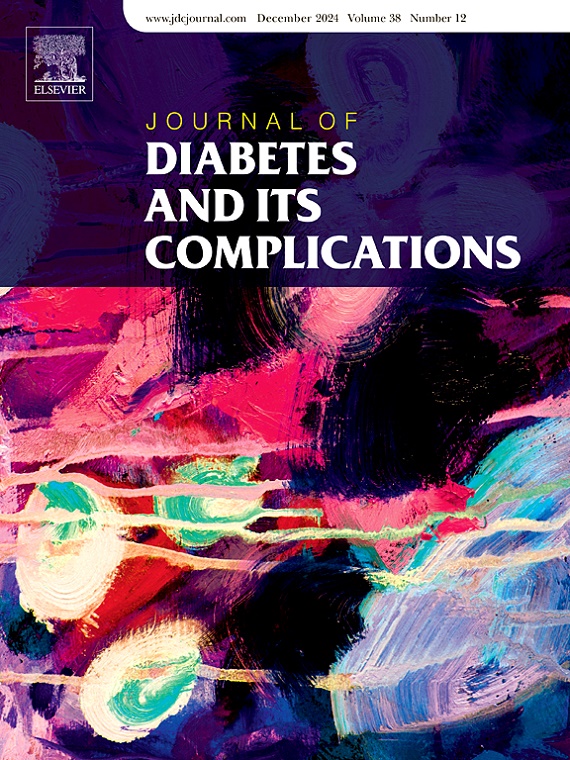Relationship between body fat and cognitive function in individuals with diabetes mellitus
IF 3.1
3区 医学
Q3 ENDOCRINOLOGY & METABOLISM
引用次数: 0
Abstract
Aim
To investigate the relationship between body fat and cognitive function in individuals with Diabetes mellitus (DM).
Methods
Cross-sectional study conducted at a clinical school between March and August 2023. Individuals aged ≥18 years, with medical diagnosis of DM type 1 or 2, treated at the clinical school were included. The outcome was cognitive function, assessed using the Montreal Cognitive Assessment. The exposure was body fat, measured by skinfolds. Crude and adjusted analyses were conducted using Poisson regression, with results reported as prevalence ratios (PR) and their corresponding 95 % confidence intervals (95 % CI).
Results
A total of 365 individuals were studied. 67.9 % exhibited cognitive decline and 91.8 % had excess body fat. Although no association between excess body fat and cognitive decline was found in the crude analysis, an association emerged in the adjusted analyses. Individuals with DM and excess body fat had a 26 % lower prevalence of cognitive decline than those without excess body fat (PR = 0.74, 95%CI 0.62–0.88).
Conclusion
Excess body fat appears to be associated with a lower prevalence of cognitive decline, underscoring the complexity of this relationship and suggesting caution in interpreting these findings.
糖尿病患者体脂与认知功能的关系
目的探讨糖尿病(DM)患者体脂与认知功能的关系。方法于2023年3月至8月在某临床学校进行横断面研究。年龄≥18岁,医学诊断为1型或2型糖尿病,在临床学校接受治疗的个体被纳入。结果是认知功能,使用蒙特利尔认知评估进行评估。暴露的是身体脂肪,用皮肤皱褶来衡量。使用泊松回归进行粗分析和校正分析,结果报告为患病率(PR)及其相应的95%置信区间(95% CI)。结果共研究了365例个体。67.9%表现出认知能力下降,91.8%体脂过多。虽然在原始分析中没有发现体脂过多和认知能力下降之间的联系,但在调整后的分析中出现了联系。患有糖尿病和体脂过多的个体认知能力下降的患病率比没有体脂过多的个体低26% (PR = 0.74, 95%CI 0.62-0.88)。结论:身体脂肪过多似乎与认知能力下降的患病率较低有关,强调了这种关系的复杂性,并建议在解释这些发现时谨慎。
本文章由计算机程序翻译,如有差异,请以英文原文为准。
求助全文
约1分钟内获得全文
求助全文
来源期刊

Journal of diabetes and its complications
医学-内分泌学与代谢
CiteScore
5.90
自引率
3.30%
发文量
153
审稿时长
16 days
期刊介绍:
Journal of Diabetes and Its Complications (JDC) is a journal for health care practitioners and researchers, that publishes original research about the pathogenesis, diagnosis and management of diabetes mellitus and its complications. JDC also publishes articles on physiological and molecular aspects of glucose homeostasis.
The primary purpose of JDC is to act as a source of information usable by diabetes practitioners and researchers to increase their knowledge about mechanisms of diabetes and complications development, and promote better management of people with diabetes who are at risk for those complications.
Manuscripts submitted to JDC can report any aspect of basic, translational or clinical research as well as epidemiology. Topics can range broadly from early prediabetes to late-stage complicated diabetes. Topics relevant to basic/translational reports include pancreatic islet dysfunction and insulin resistance, altered adipose tissue function in diabetes, altered neuronal control of glucose homeostasis and mechanisms of drug action. Topics relevant to diabetic complications include diabetic retinopathy, neuropathy and nephropathy; peripheral vascular disease and coronary heart disease; gastrointestinal disorders, renal failure and impotence; and hypertension and hyperlipidemia.
 求助内容:
求助内容: 应助结果提醒方式:
应助结果提醒方式:


